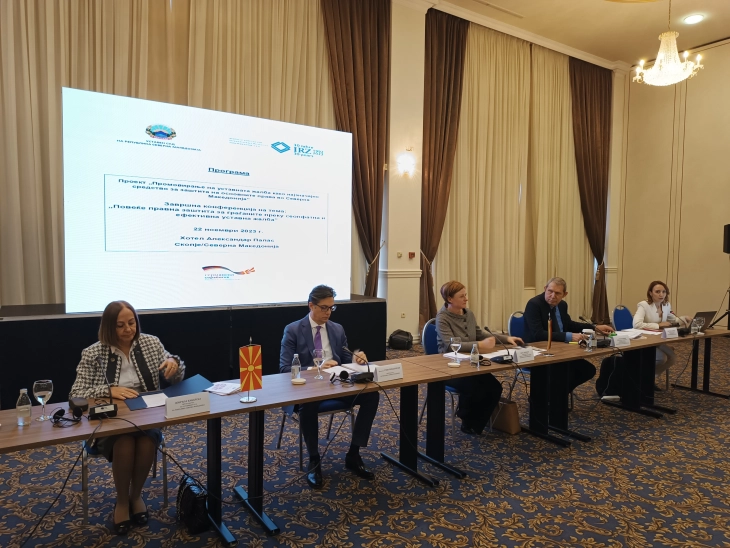Introduction of constitutional appeal - step towards strengthened protection of human rights and freedoms: conference
- North Macedonia, like the other five former Yugoslav states, faced the same challenges after the declaration of independence: the establishment of independent bodies and institutions with a clear separation of power. But we didn’t all respond the same way to the needs of the citizens to fulfill their constitutionally guaranteed rights. Considering the experiences in the region, North Macedonia has remained alone regarding the issue of constitutional appeal, said the President of the Constitutional Court, Dobrila Kacarska at a conference Wednesday focused on better legal protection for citizens through a comprehensive and effective constitutional appeal, organized by the German Foundation for International Legal Cooperation (IRZ) and the Constitutional Court.

Skopje, 22 November 2023 (MIA) – North Macedonia, like the other five former Yugoslav states, faced the same challenges after the declaration of independence: the establishment of independent bodies and institutions with a clear separation of power. But we didn’t all respond the same way to the needs of the citizens to fulfill their constitutionally guaranteed rights. Considering the experiences in the region, North Macedonia has remained alone regarding the issue of constitutional appeal, said the President of the Constitutional Court, Dobrila Kacarska at a conference Wednesday focused on better legal protection for citizens through a comprehensive and effective constitutional appeal, organized by the German Foundation for International Legal Cooperation (IRZ) and the Constitutional Court.
Kacarska said the introduction of the constitutional appeal would provide the country’s legislation with a new legal tool for the protection of rights and freedoms.

“Met with a lack of will and recognition of the importance of this legal document by the political stakeholders and representatives of all parties in Parliament, we received support from our friends from IRZ, who, with the approval of the German Ministry of Foreign Affairs, invested expertise and finances to help create a study on the constitutional appeal, also internationally known as the constitutional lawsuit,” stressed Kacarska.
The study, she said, is a product of a longer collaboration between the Court and the IRZ, and it will provide a direction for the introduction of the constitutional appeal, which would allow the citizens of North Macedonia to submit an appeal to the Court over all constitutionally guaranteed rights.
“The Republic of North Macedonia has lost numerous cases at the international courts, and we should not see them solely as statistics, they are also an indicator of the urgency for the introduction of the constitutional appeal,” said Kacarska.
The President of North Macedonia, Stevo Pendarovski, assessed the constitutional appeal as a “proven efficient tool”, and the best example for that, according to him, is the practice of the Constitutional Court of the Federal Republic of Germany.
“Even though there have been several initiatives to amend the Constitution to that end, unfortunately, a whole series of parliamentary compositions could not gather the strength to implement this. I hope that in the near future, the political public too will also grasp the importance of introducing the constitutional appeal as an important segment of the reforms, and a step towards the strengthening of the system for the protection of human rights and freedoms,” said Pendarovski.

In answer to a journalist’s question over concrete actions for the introduction of the constitutional appeal, the head of the IRZ’s South Eastern Europe I project unit, Stefan Pürner, underlined that the most important thing is to introduce a law on the Constitutional Court.
“If we look at the German experiences, then I will say, the most important thing is to introduce a law on the Constitutional Court, because in that way, the constitutional appeal would be explained in the most clear and transparent way. You have the foundation for the introduction of the constitutional appeal, since that possibility is rooted in your Constitution, in article 110,” said Pürner.
The conference was also addressed by the German Ambassador to North Macedonia, Petra Drexler.
Photo: MIA







